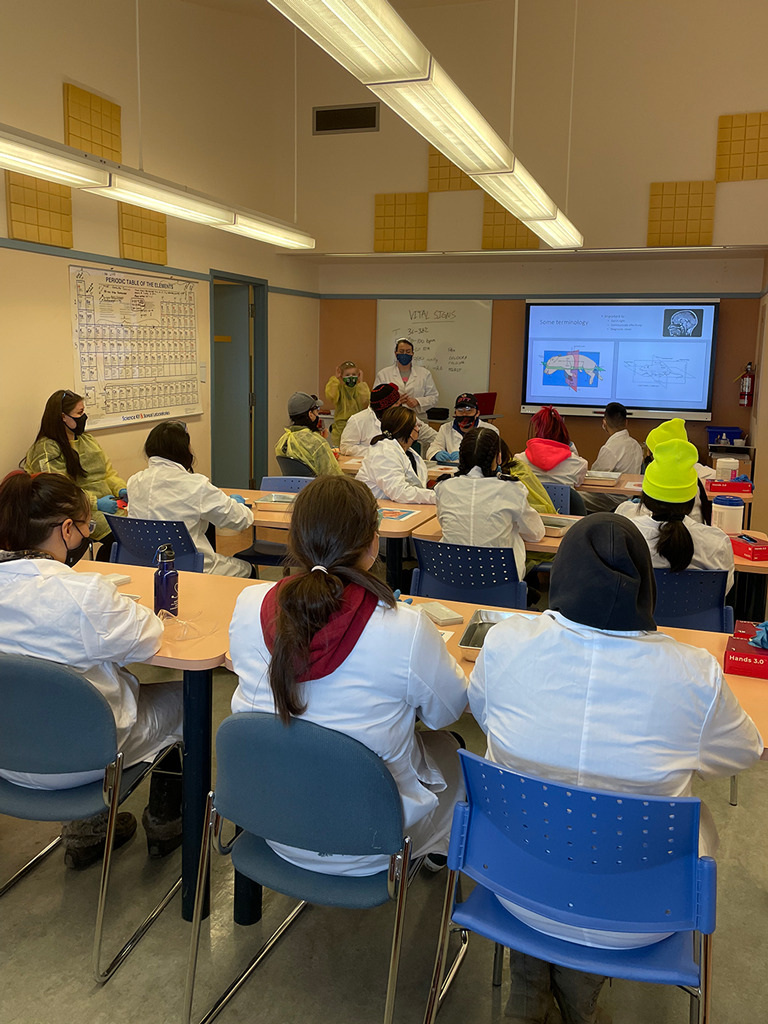By Michelle Read
Writer
The Faculty of Medicine has entered into a new partnership program aiming to address the under-representation of Inuit health care professionals in Nunavut.
In their annual reporting on Inuit employment levels, the Government of Nunavut revealed the relatively low percentage of Inuit representation in health care—11% of the workforce at the professional level—in Nunavut’s Department of Health.
Per a recently signed agreement with the Government of Nunavut and Nunavut Tunngavik Inc. (NTI), the Faculty will set aside a minimum of two seats in the Faculty’s MD program for Nunavut Inuit and Nunavummiut students. The cost of tuition will be fully funded by the Government of Nunavut.
The dedicated spots highlight the commitment of the Faculty of Medicine to respond to the Truth and Reconciliation Commission Calls to Action by addressing longstanding gaps in the Inuit physician workforce and ultimately enhancing access to culturally safe care in Nunavut Territory.
Territorial chief of staff Francois De Wet acknowledged the necessity of Inuit patients having their needs served by Inuit physicians and to receive care within their own community.
“It’s a very traumatic thing to have to go to another city, with strangers, for your medical needs,” Dr. De Wet said in a recent release.
Aluki Kotierk, president of NTI, echoed those sentiments.
“Over the next few years, we would like several cohorts of Nunavut Inuit to begin training toward becoming a doctor,” she said in the release. “The training and employment of Inuit health care professionals is essential for accessible, safe, high quality Inuktut health care in Nunavut.”
Poor access to health care is leading to health challenges among Nunavut’s Inuit.
Research led by Dr. Jason McVicar reveals that compared to the general population, Nunavut Inuit were 25% more likely to experience serious complications after surgery. Dr. McVicar is an assistant professor in the Department of Anesthesiology and Pain Medicine and an anesthesiologist of Métis descent at The Ottawa Hospital.
Dr. Claire Kendall is the associate dean of social accountability at the Faculty. She says the partnership extends beyond simply reserving positions for Inuit learners.
“It’s also about countering the persistent and systemic barriers in the education system that have impacted the eligibility of potential Inuit applicants for admission to medical programs,” she says of the partnership, one of the first of its kind in Canada.
The partnership also includes a development program in collaboration with the Indigenous Program, explains Dr. Geneviève Lemay, assistant dean of admissions at the medical school.
“The program works proactively with Inuit students early in their trajectories to meet eligibility criteria especially with academic requirements, such as prerequisites, as well as providing support through the application program,” says Dr. Lemay.
Many of these supports will be provided through the activities of the Faculty’s Indigenous Program.
Dr. Darlene Kitty, director of the Indigenous Program, acknowledges the urgent need for Inuit physicians.
“There is really a need for Indigenous physicians treating their own patients and communities—someone who knows the realities and the challenges and also the strengths of their culture,” she recently told The Ottawa Citizen. “When a patient is seen by an Indigenous physician, they have that connection.”
The Indigenous Program is one of several stakeholders on a steering committee that plans a health careers camp for youth in Nunavut. This month, representatives of the Indigenous Program headed to the camp in Iqaluit to facilitate a workshop for Inuit youth interested in pursuing a career in health, leading a suturing workshop and giving lessons in anatomy.
In addition to exploring health careers, trying out clinical skills like suturing and inserting IV’s, and meeting role models in health care from Nunavut, students were invited to build a career planning portfolio, mapping out needed courses for the careers that interest them.
“We are pleased to provide funding and other supports for Nunavut Inuit to gain skills and qualifications through the Makigiaqta Quvvariarniq program and national Inuit Post-Secondary Education program,” says Kilikvak Kabloona, chief executive officer of NTI. “The partners will work together to support medical learners to become physicians.”
The Faculty will leverage its commitment to working closely with a broad network of local community groups.
“We anticipate collaborating with the strong Inuit community in Ottawa to create an appropriate community of support,” Dr. Kendall says.
The Faculty is proud to be a part of the partnership, and anticipates welcoming the first Inuit learners in the fall of 2023.
“Social accountability has taken a front seat in the Faculty’s priority lineup reflected in our five-year strategic plan,” says Dr. Kendall.
“This partnership represents our firm commitment to closing the gap in medical care for patients in Northern communities."
Main photo: As part of a tour of the Qikiqtani General Hospital in Iqaluit, the group of Indigenous youth posed here with staff and volunteers. Zach Verret-Borsos (back row, far right) and Indigenous Program Coordinator Tanya Lalonde (middle row, 2nd from right), both from the Faculty of Medicine, were in Iqaluit to offer workshops during the May Health Careers Camp. “Planting those seeds early is a key component of the Indigenous program and we hope that through our partnerships, outreach and mentorship approach we can inspire more Inuit youth to pursue a career in medicine,” says Tanya.
All photo credits: Tanya Lalonde/NVision
Consider supporting the University of Ottawa
The Social Accountability Initiatives At The Faculty Of Medicine fund was established to support activities that enhance the reciprocal transformation of the medical school and the communities we serve through meaningful community and stakeholder engagement, enhanced learner experience, and collaborative scholarship.


Let’s Talk Science: Engaging youth in education
The Ottawa branch of Let’s Talk Science, an award-winning national outreach program that engages youth in STEM education, has been heavily involved in the Nunavut Health Careers Camp. Director Sue McKee sits on the steering committee that plans the camp; as well, the organization funded the participation of a Let’s Talk Science team to help lead activities, including volunteer Zach Verret-Borsos, 2nd-year MD student from the uOttawa Faculty of Medicine.


